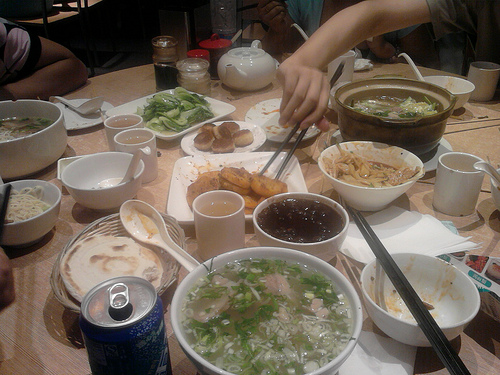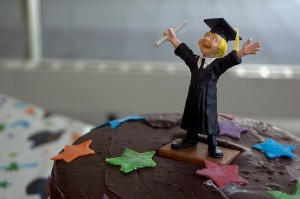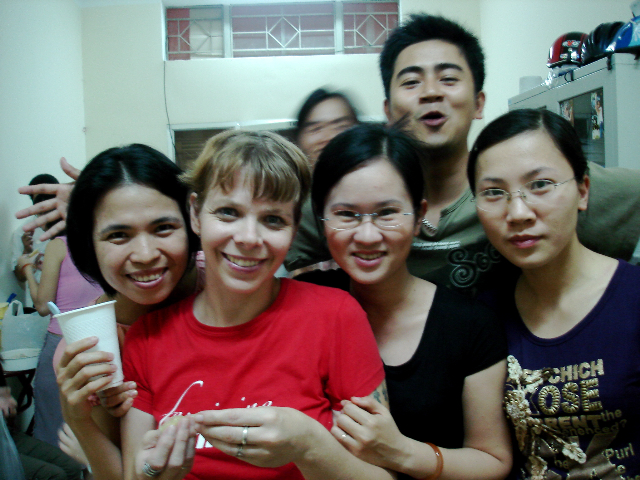by Teresa Coates
 It must be just about lunchtime; the cicadas are screaming again. Little time-keepers, they are. Every spring, they crawl from the ground, rising from the silence of winter, to signal the change of the season here in northern Vietnam. Twice a day, the thumb-sized males sing out in unison, shaking against the trees, creating a group love song that calls out to the ladies. I head into the kitchen to start lunch. There are only three walls in our kitchen — the fourth is open to the courtyard, barred to keep out intruders, but not the cacophony of sound or waves of summer heat. The bamboo shade billows up with the wind, cooling me just slightly. It’s early June, but the temperature is already well into the 90s.
It must be just about lunchtime; the cicadas are screaming again. Little time-keepers, they are. Every spring, they crawl from the ground, rising from the silence of winter, to signal the change of the season here in northern Vietnam. Twice a day, the thumb-sized males sing out in unison, shaking against the trees, creating a group love song that calls out to the ladies. I head into the kitchen to start lunch. There are only three walls in our kitchen — the fourth is open to the courtyard, barred to keep out intruders, but not the cacophony of sound or waves of summer heat. The bamboo shade billows up with the wind, cooling me just slightly. It’s early June, but the temperature is already well into the 90s.
I visited the fresh market down the block soon after the sun rose to begin to heat the air once more. Even in what might be called the cool of the morning, it is warm. Learning to sweat without humiliation was just one of the skills I had acquired since coming to Vietnam. I’ve also learned to use chopsticks for every food group, how to offend the nice fruit-seller at this market (unintentional, but a lesson I won’t soon forget), and how to say ‘I don’t understand Vietnamese’ in fairly good Vietnamese.
I bought four foot-long carrots, two goose eggs, a small chartreuse-colored squash, my daughter’s favorite chocolate drink mix: Milo, a whole chicken (head and feet intact), and two fruits of the gods: pineapple. The woman selling the small variety sat in the shade of another’s awning, her wicker tray filled two feet high with six-inch pineapples. I hold up two fingers in a peace sign and she grabs a pair and I nod, yes, they’re good. She pulls out her cleaver, deftly peeling them and removing the dark eyes with swift chops of the knife. No matter how many times I’ve watched her, her skill amazes me every time.
Standing in the kitchen, lunch being signaled by the call of lovesick cicadas, I pull out my small round cutting board and my own cleaver. I’m not nearly as adept as the pineapple slinger. I chop vegetables while the chicken cooks in a pot of already-boiled water atop our two-burner gas stove. Sweat slides down my temple. I wipe it with the sleeve of the torn t-shirt I’m wearing.
“Stuart!” I call to my son in the next room. “Can you bring me the rice from the fridge?”
Our miniature gray refrigerator sits next to the bed that we share in our tiny studio apartment. Two kids and one mom in a 12-by-20-foot room calls for some clever furniture arrangement and the patience of Job, but it works for us.
Stuart, 15 and nearly as tall as me, pushes the door open and pokes only his hand and a plastic bag of cold, cooked rice into the room. The air-conditioning is only in the main room, so the bathroom and kitchen swelter.
I place the rice on the tiny counter space that isn’t covered by the gas stove and get to work on assembling the fried rice: carrots, squash, onion, garlic, egg, then stir in the rice. I mix in the soy sauce and pour everything into a large plastic bowl, fluted with vibrant orchids screen-printed on the sides. We’ll eat in the other room, circling the short coffee table that doubles as our dining table while the cicadas serenade.
This isn’t what I’d imagined for my life. As a teenager, I hoped to study fashion design. I wanted to learn how to sew and to leave that small town. I never dared to dream this big, this let’s-get-rid-of-everything-and-move-to-a-foreign-country big. This was a fluke; something that would have been impossible if my life plans hadn’t gone awry.
I married young, to a young man. Just after our ninth wedding anniversary, he met Sarah, a 16-year-old music junkie. After a while of spending all his time with her, he decided he’d missed out and wanted to try to be a rock star, to live life over. This time without a wife or kids. Just like that, the three of us were on our own.
It’ll be fine, I assured myself. He’ll realize how wonderful it is to have kids around. We’ll be a family again. I kept that going for the next six months before denial turned to anger, just as Kubler-Ross’s famous five steps of grief predicted. I pounded my fists against the pale cream walls of our apartment while the kids spent the weekend with my parents. I left him curt phone messages. I cried and cried and cried.
I pleaded with him to give up the girlfriend, to come back, but he said he was happier than ever. I was sure it was an early mid-life crisis. I spent another month or two planning suicide before I realized that by intentionally dying after their dad intentionally left, I would totally screw up the children’s lives. And that, to be sure, was the last thing I wanted. It was time to suck it up and be a (wo)man.
Out came a yellow pad of paper. As a writer, I had several stashed around. By this time most were half-filled with morose scrawling and angry, never-sent letters, but I needed one for a higher purpose now. I needed to figure out just what the hell I was going to do with my life.
Come on, girl: Think. What have you always wanted to do and never done?
I stared at the paper. My right hand held the black Papermate so that it barely touched the paper. And there it stayed until I gave up and went to bed.
 The next day, it was the same activity, but with small squares of Post-It notes instead. Bright yellow with more lines than I could possibly fill, the legal pad had stifled me. Now I had only a three-inch square of pink paper with a narrow strip of tacky glue.
The next day, it was the same activity, but with small squares of Post-It notes instead. Bright yellow with more lines than I could possibly fill, the legal pad had stifled me. Now I had only a three-inch square of pink paper with a narrow strip of tacky glue.
Think of something. Anything.
I’d asked my husband about taking community college classes, but money was always tight and he was adamant that education wasn’t the key to happiness or success. “Yeah, someday,” he’d assure me. That someday wasn’t up to him anymore and dammit, I wanted a bachelor’s degree. Majoring in what? Who knew. I’d figure that out later.
On the pink square I wrote: Go to college.
Getting something down broke the small dam and the ideas started flowing, big and bold (Be a millionaire!) then tempered by reality (I make $8.50 an hour!). Finally I settled on three:
Go to college.
Live in a house again.
Travel somewhere.
I held the square, sticking it to my index finger and read aloud. Yep, that was good enough to start with. Not too restrictive, but not too easy. Absolutely do-able. Retrieving my journal from the bookshelf above my bed, I opened it to the next blank page, dated it and pressed the pink Post-It below. Forget New Year resolutions, these were my new life resolutions.
Six months later, I found a house in the Brooklyn neighborhood of Portland. Rent was almost affordable with a fair amount of penny-pinching. Since I was working full-time for a wood stain manufacturer, my income was steady enough to justify the splurge on a two-bedroom house. We had a backyard, complete with a worn hammock hung across limbs of the magnolia tree that covered much of the yard in cool shade. I’d lie crosswise, swinging, watching two-year-old Audrey play in the wading pool we set up in the sunlit area of grass while Stuart, then seven, played Zorro with our neighbor’s black leather whip. When fall came, I was registered as a new student. For the first time in thirteen years, I sat in a classroom again.
 The first few terms were an exercise in fortitude and motivation. Older than 90% of my fellow students, I didn’t quite fit but I had more life experience and more appreciation for what I was learning. Two years into the program, I took my first Women’s Studies class. I argued, unheard, that it should be labeled Gender Studies to be more accurate, but to no avail. In Professor Hummer’s class I learned how the intersection of my gender, religious upbringing, age and class had created a filter that influenced the decisions I’d made. I began retrieving the independent streak that had been buried during my marriage. I took another class from her and another, then ventured out to other teachers and slowly emerged as a fiercely independent woman devoted to her children. For the first time in my life, I had a small hold on that mantra I’d long heard proclaimed: I can do anything I set my mind to.
The first few terms were an exercise in fortitude and motivation. Older than 90% of my fellow students, I didn’t quite fit but I had more life experience and more appreciation for what I was learning. Two years into the program, I took my first Women’s Studies class. I argued, unheard, that it should be labeled Gender Studies to be more accurate, but to no avail. In Professor Hummer’s class I learned how the intersection of my gender, religious upbringing, age and class had created a filter that influenced the decisions I’d made. I began retrieving the independent streak that had been buried during my marriage. I took another class from her and another, then ventured out to other teachers and slowly emerged as a fiercely independent woman devoted to her children. For the first time in my life, I had a small hold on that mantra I’d long heard proclaimed: I can do anything I set my mind to.
My four-year degree was turning into six years, but I could finally see a light at the end of college’s tunnel vision. There, in the too-near future, full-time work and after-school care awaited me. Was that what I’d been working for all this time? In a way it was, but not quite yet. What better time was there to take a break in life’s course? None; I’d spent seven years as a stay-home mom and another six as a student. Now, I had the freedom I needed. I’d take a gap year, like so many other university graduates do, and spend some time ‘discovering myself.’ And my children would get to do the same alongside me. So, in my last year of school, I decided that we should go to Vietnam. Why not? I had a friend living in Hanoi. We could volunteer at some orphanages and see a bit of the world. No matter that I was an international travel virgin. Travel somewhere, I’d written, and South East Asia seemed as good a place as any other.
The plan was basic. My last quarter ended in December; we’d leave a week later on Boxing Day and end up in Tam Ky a week after that. Best laid plans and all, but life gets in the way sometimes. I failed my online class and wouldn’t be graduating in December after all. It was three days before we left, two days until Christmas and one day until we had to be out of our house — my plans seemed shot to hell.
I registered for the next term, taking the same online course once again, and packed my textbooks into the suitcases. I just prayed there was Internet access in central Vietnam. Without it, I’d fail again and wait until I returned to the States, an unknown date in the future.
The night sky was still pitch black as we boarded the plane with one-way tickets and $13 in cash. The months before I’d spent reassuring my overwrought mother and my still-angry-about-the-war father that we’d be fine, but as the plane took off, rotary blades whirring, I couldn’t help but wonder if I should have started with something easier, like a trip to Orlando.
This sultry June day in Thanh Hoa, Vietnam is the zenith of my divorced-mother life and we’re celebrating. I’d finished my second try at the anthropology class two months ago, earning a B-. I had finally, after more quarters of three-credit classes than I cared to count, finally satisfied the university’s requirements for a bachelor’s degree. Tonight, more than 7,000 miles away, my name will be called in the graduation ceremony. I won’t be walking across the stage, but instead I’m walking hand-in-hand with my children, across the busy street to the open-air market where they sell the best coconut ice cream on earth. Audrey and I grab an empty table while Stuart buys three bowls of ice cream. I pull the sweet pineapple out of my bag, specially chopped earlier for the occasion. Audrey had requested Milo for her bring-your-own-toppings sundae. The locals who surround us aren’t sure what to make of our concoctions, as we spoon fruit and chocolate powder over our ice cream.
Sweat beads on my nose, the night air still humid. Stuart catches my eye and I smile, sincerely. I love it here in this warmth and simplicity. The stars fill the sky and the crescent moon looks tilted. My whole life looks different from here — nothing like I’d expected all those years ago as a young bride — and I’m elated.
* * * * *
Teresa Coates is a Portland, Oregon-based writer, but prefers to live in Southeast Asia. Along with her two children, she has visited Vietnam, Thailand, Malaysia, China, Hong Kong, Taiwan, South Korea and Japan. The trio hope to return in 2011.
Photo credit:
Vietnamese Woman on Boat: McKay Savage
Dinner table: Micah Sittig
Post It Motivationphoto: Amy
Graduation cake: CarbonNYC
All other photos: Author